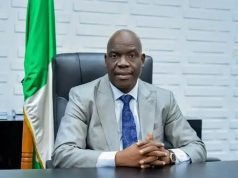By Thomas Uzah PhD
Sometime in June 2015, barely 10 days after the inauguration of President Muhammadu Buhari as Nigeria’s democratically elected leader, a BBC Africa Security Correspondent, published an analysis, captioned; “Will moving Army to Maiduguri help Nigeria against Boko Haram?” The report captured President Buhari’s earliest decisions and actions in office to stymie the raging and devastating Boko Haram insurgency in the country.
Though the analysis encapsulated different conditions of the subsisting insecurities in Nigeria, a phrase was catchy. He wrote about the Service Chiefs perception and response to the Presidential order to relocate the Military Command and Control Centre from Abuja to the Northeast, the hotbed of the insurgency. President Buhari issued the order to centralize operations nearer the heart of the insurgency, ease bureaucratic bottlenecks and speedy decision-making on the field combats.
But some Military Chiefs loathed this directive. They preferred the comfort of cosy offices in Abuja, then shadow anywhere near the theatre of war. Therefore, they were hesitant, silently grumbled and clandestinely remonstrate. Eventually, though, they bowed to the supremacy of Military creeds, as the BBC report later exposed.
The catchy phrase in the report chanted defiantly on the relocation of Military Command and Control Centre to the Northeast epicentre of Boko Haram terrorism stated; “However, the new strategy has not gone down well with some top military men, who view it as a symbolic, populist move by President Buhari, attempting to set himself apart from the previous administration under Goodluck Jonathan.”
Time explains seemingly complex mysteries. The phrase made it abundantly clear the phobia of some senior military officers under the previous administration in leading troops to dismantle the dreaded Sambisa Forest, Boko Haram’s most secured fortress. It was a forest where insurgents hid and persistently emerged to bloodily strike the heart of Borno State and other parts of the Northeast.
Formerly, Sambisa was Boko Haram’s centre for training recruits. It served as a venue for plotting their heinous atrocities and recuperation ground after strikes of violence on communities and villages. Boko Haram’s factional leader, Abubakar Shekau and top commanders of the sect had their most vaulted “mansion,” in the forest’s “Camp Zairo.” Some refer to it as Camp Zero from where they easily coordinated their atrocious acts. The natives called Camp Zairo “Sabil Hida”, meaning the “righteous place,” but insurgents renamed it after they annexed it.
However, the face of the counter-insurgency operations changed with the arrival of Gen. Tukur Yusuf Buratai, as Chief of Army Staff (COAS) and ombudsman of the anti-insurgency operations. He started commanding the battle from the front and not the back seat, very fruitfully and rewardingly. The crack Infantry Combatant never faltered nor dreaded the trenches or waterfront any day. Even the ambush and attack on his convoy by Boko Haram terrorists didn’t scare or dissuade him.
Gen. Buratai studied the minutiae of the insurgency and discovered a huge concentration of terrorists in Sambisa. He vowed they must not be allowed to possess the forest and then planned several months to capture it.
And when Gen. Buratai and other Commanders led troops to strike in December 2016, Shekau, his top commanders and foot soldiers sheltered in this enclave were massively dislodged. Some insurgents met their waterloo in the encounter with troops; while a few others escaped, including the factional terror leader.
But from the historic capture of the Sambisa Forest on December 22, 2016, Gen. Buratai brought back to Abuja relics of the demystification, penetration of Camp Zairo and subjugation of Shekau’s empire. The Shekau’s personal effects obtained by the Army were a copy of the Holy Quran and Boko Haram jihadi flag among others.
However, the battle to free Sambisa Forest and entrapped communities in the area had just started. It was clear Boko Haram insurgents were pained to lose their fortified fortress of shelter. Being a vast forest, the insurgents again regrouped and reoccupied other parts. In his customary fashion, Shekau sneaked and reoccupied Camp Zairo from where he organized his foot soldiers to launch pockets of attacks on obscure communities.
Regardless, Gen. Buratai never flinched. Throughout 2017, the leader of counter-insurgency operations turned the Northeast into his permanent home and intensified clearance operations in enclaves within Sambisa Forest to flush out remnants of insurgents.
Gen. Buratai eventually pulled down the final walls of the forest; cleared all the areas re-possessed by insurgents, confiscated their weapons, again dislodged Abubakar Shekau from Camp Zairo and recaptured it by end of 2017. The second military raids on Sambisa were more deadly on terrorists.
In a video later released, the factional Boko Haram leader confessed to suffering heavy casualties and expressed frustration with the war, preferring to die than live. Still hotly trailed by troops, Shekau disguised into a woman, dressed in hijab and sneaked out of the Northeast. He remained in the cooler and silent for months.
At the start of January 2018, Gen. Buratai sojourned back to Sambisa on an operational thank-you visit to troops and to convey the President’s appreciation to soldiers stationed in different locations of the forest who performed the feat.
The helicopter conveying the COAS from Maiduguri first landed in Bitta village, a small settlement in Sambisa. Thereafter, he proceeded to Tokumbere and then, drove in an MRAP vehicle with his team to Camp Zairo. He arrived at the spot by 4:15 pm. There, Gen. Buratai was conducted round the Battle Groups 1 and 2 locations and addressed troops. He also inspected the armoured fighting vehicles and equipment captured from Boko Haram terrorists.
It was right inside the darkest belly of Camp Zairo that Gen. Buratai issued the order to troops on the capture of the escapee factional leader of Boko Haram, Abubakar Shekau “red-handed.” “We must move across wherever this criminal is to catch him red-handed. I want you to get him by hand,” he said.
The display of courage by Gen. Buratai was confounding. Those naturally passionate about the Army fear or dread nothing. They are not scared by the possibility of death or quake at the prospects of danger. The COAS embodies these virtues in abundance. He is more excited in the trenches than swirling on a chair in an air-conditioned office.
This can be gleaned from an axiom in the interview he granted reporters while in Camp Zairo; “I see all operations in the field as adventurously, a thunderous conquest of the enemy. I always want to explore new tactics, new manoeuvres and approaches to achieving tactical and operational objectives. Fighting wars should be seen as fun with serious, bold, decisive and aggressive approaches to dealing with the adversaries in an unconventional military environment. It is what excites me deeply.”
No wonder, Gen. Buratai is infinitely irritated when a soldier becomes hysteric at the sight of the battle. Not long ago, at the workshop on Transformational Leaders in Abuja, the COAS voiced a directive to all commanders to flush out lazy soldiers as “The NA will do all that is necessary to fish out any bad eggs whose willingness to lead or follow as required has waned…Transformational leaders should not wait for them to get out of the way, you must kick them out of your way.”
Dr Uzah is head of department, Mass Communication, Kwararafa University Wukari.







